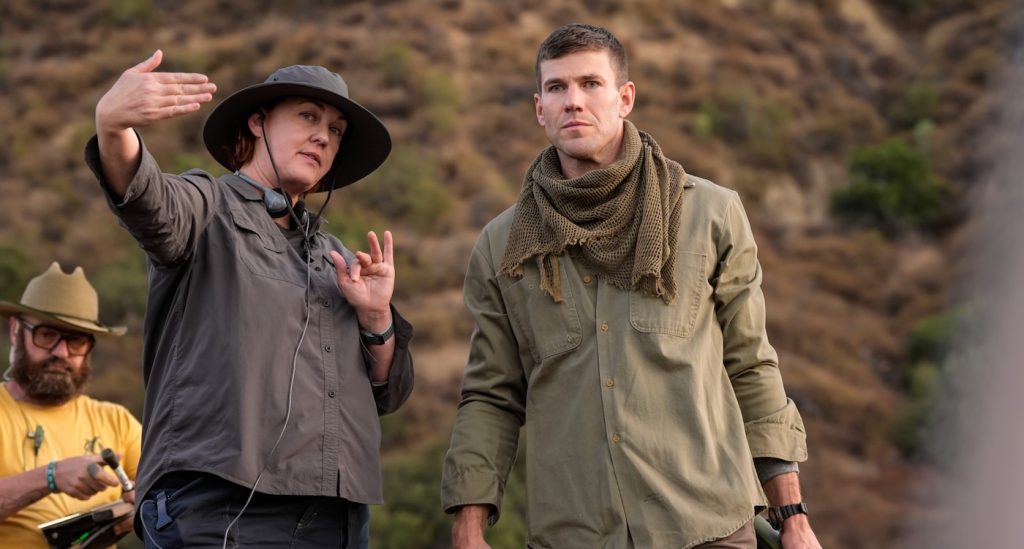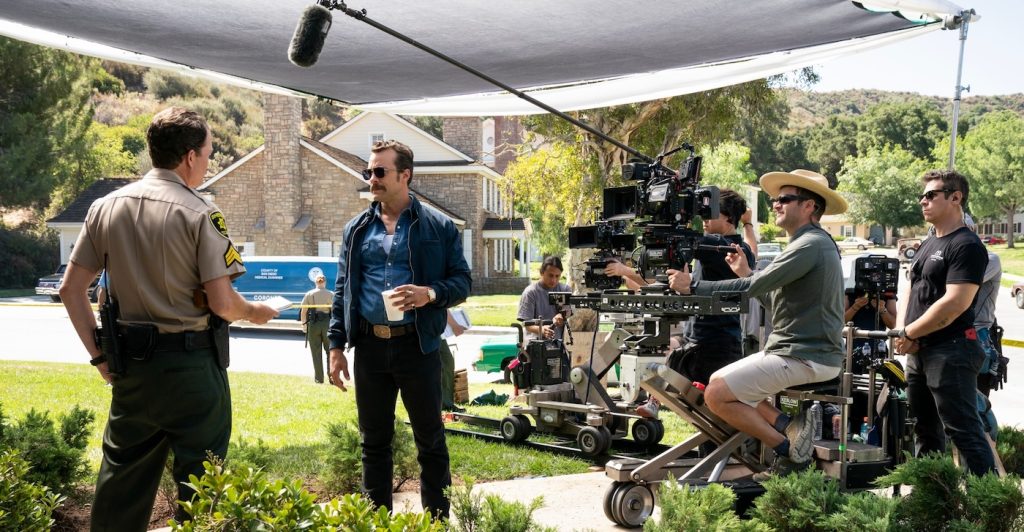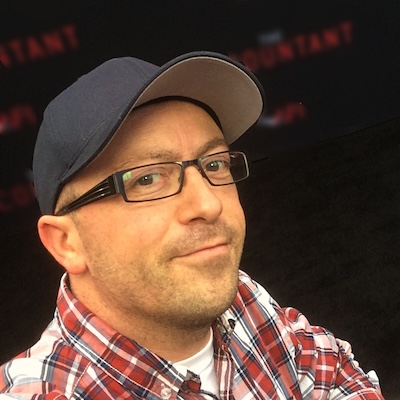Home Field Advantage: “NCIS: Origins” Showrunners on How Tax Credits Anchored Their Prequel Series in California
Already renewed for a second season, the NCIS franchise spin-off NCIS: Origins has been capturing a new generation of fans. In addition to the 90s set prequel’s heady mix of powerful storytelling, music, and a dynamic young cast, showrunners David J. North and Gina Lucita Monreal credit a lot of the show’s appeal to the fact that it’s set in and filmed in California.
The CBS show follows a young Leroy Jethro Gibbs (Austin Stowell), the iconic character made famous by Mark Harmon, as he begins his career before the events of the original NCIS series. He’s a newly minted special agent at the fledgling NCIS Camp Pendleton. That’s where he starts to make a name for himself and assembles “a gritty, ragtag team.”
Here, North, known for previously writing NCIS and NCIS: Los Angeles, and Monreal, a producer on the original NCIS, explain the importance of California’s tax incentives and its unparalleled pool of creative talent to the fabric and success of NCIS: Origins.
NCIS: Origins has already been renewed for a second season. You must be delighted.
North: We have felt very supported by CBS and Paramount from the beginning. NCIS means so much to us, and I have spent a huge portion of my career on it. Going into Origins, we wanted to find that NCIS magic but also do it differently. Gina and I were not interested in doing cookie-cutter ‘insert NCIS here.’ We wanted to create a character-driven show, and that’s what we did. It’s one of those things where the audience is building, and people are hopefully enjoying the ride with us.
NCIS: Origins is shot on the Paramount lot in Los Angeles and on location in San Pedro, which doubles for San Diego. How important is it for you to shoot in California?
North: It helps us enormously. For us personally, being here close to our loved ones is great. Shooting in LA is a real gift, and it’s a gift that many people no longer have. For us to have received the tax incentive and be on the Paramount lot, which is so storied, brings energy and history to what we’re doing. There’s something special about Hollywood, and we feel very grateful to be able to make this show here.
Monreal: Even just stepping on set, you feel the happiness of the crew and the cast in being home. We already face the challenge of being a period show because we’re set in the 90s, so being able to be in the actual location helps make the show look more authentic.
Tax credits make shooting in California a lot easier and more appealing. Are you hoping to utilize California and the workforce here even more in season two?
North: We’re always looking for different locations that match each episode. First of all, we have to break each episode. We’re so grateful that we received that tax credit. Beyond that, we write the scripts, then check out the locations and see what we can get. We’re very fortunate to be in LA.
Monreal: We couldn’t shoot here without the incentive, so we jumped up and down when we got it. We knew it was important not only for the storytelling but also for the community we’ve built around the show. It was a huge deal for us to get that.
Los Angeles and greater Southern California offer a wide range of different types of buildings and locations. How much does that help the production because you don’t have to recreate everything?
North: I was driving in Hollywood the other day with my girlfriend, and she looked down and was like, ‘Look at that hotel. It absolutely looks like something out of 1957,’ and I said, ‘Oh yeah, I’ve shot there before. That’s why they keep it that way.’ It’s a totally unique space, and what we have here is so rare. Niels Arden Oplev directed our pilot. He doesn’t do many episodes of television, only pilots and features, but he also directed our season finale. Shooting NCIS: Origins was the first time in his career that he shot in LA, and this guy has had a long career. He was so excited.

You did have to recreate Camp Pendleton, located just outside San Diego. What did it take to achieve that, and why did you want to make that creative choice?
North: We spent the day there with our writers and our line producer, Michele Greco. We have an amazing locations team that found San Pedro for us, and we built a little camp there at Camp Pendleton. We took some buildings, painted them up, and brought in our own guard gate. Post-9/11, Camp Pendleton has a huge and very technical guard gate, but in 1991, it was just an armbar that they lifted themselves, so we brought that in.
Monreal: Some buildings there are from our time period, so we pay special attention to those. We looked in books, and in one, there was a picture of the actual building where the National Intelligence Service was at the time, so we used that as inspiration. Our production designer, Rusty Smith, was incredible. He had the idea to make it a Quonset hut.
North: Interestingly, our bullpen’s interior is a Quonset hut. It’s an old World War II thing. This is a true story. Mark Harmon called me and said, ‘Do you know what? The bullpen should be a Quonset hut.’ Mark likes Quonset huts. There are a million things going on when you’re launching a show, and I forgot about it, but Rusty came in and pitched us to be our set designer and threw in the idea of a Quonset hut. I said, ‘Well, that’s there you go. Serendipity. We’ll hire him.’ He’s fantastic.
Shooting in LA means that you have access to an incredible pool of creative talent, many of whom have been struggling to find work. Did that make it easier to assemble the best team?
North: Our line producer, Michele Greco, has been in LA a long time and has worked with a lot of these people, so he brings them to us. In many cases, department heads and Gina and I would also interview them, but we hired Michele and then rely on him. Michele has done a lot of things in Atlanta, and he would often talk to us about the amount of talent in LA sitting at home. We really did feel like we had our pick and hit the jackpot. I know people say this, but I believe we have the best crew in the world. We’re so thankful for them.

The show deals with issues like mental health and military trauma. Did you hire advisors to ensure you were covering these issues with accuracy and sensitivity?
Monreal: We did a lot of research when it came to that, but I have personal experience with members of my own family, too. We have some of our staff writers who have had personal experience with the military, so we really drew on all of those resources while trying to stay true to the character of Gibbs, who has this trauma in his past. We’re using that as a core of the story, but we’re also delving into what that does to your personality, way of thinking, and mindset.
North: We have a guy named Daniel in our writer’s room. I don’t know how many tours he did in Afghanistan, but he was a sniper. Those stories and the losses that he suffered are all infused into the show in different ways. We also have two technical advisors, RJ and Leon Carroll. Leon was the technical advisor for the entire run of NCIS. We’ve had a lot of resources, and I hope that’s reflected in the show. We take a lot of pride in how real and grounded we keep it.
NCIS: Origins is on CBS and streaming on Paramount Plus
For more films and series from CBS, Paramount and Paramount+, check out these stories:
From Saddles to Switchboards: Sound Maestro George Haddad Crafts the Symphony of “1923”
Tom Cruise Hangs On For Dear Life in “Mission: Impossible – The Final Reckoning” Trailer
No More Games: “September 5’s” Oscar-Nominated Writers on the Day Terror Took Center Stage
Featured image: Pictured (L-R): Kyle Schmid as Mike Franks, Mariel Molino as Cecilia “Lala” Dominguez, and Caleb Foote as Bernard “Randy” Randolf. Photo: Erik Voake/CBS ©2024 CBS Broadcasting, Inc. All Rights Reserved.



